

As part of the latter half of our work-based learning module (AEL3001), we had to complete simulated interviews within groups. My group consisted of Ethan, Annabel, Rachel, Holly, and myself. Being able to practice interview technique and reflect upon my responses along with interviewing my peers and giving them feedback has been constructive and worthwhile. It forced me to think sensibly about my answers to common interview questions as well as seriously reflect upon them in relation to my personal ambitions for the future, something I’m often reluctant to think about.
Learning which involves a change in self-organisation — in the perception of oneself — is threatening and tends to be resisted. […] The most socially useful learning in the modern world is the learning of the process of learning: a continuing openness to experience and incorporation into oneself of the process of change.
Carl Rogers (1969, 159-163)
To learn from personal reflection is to accept change in accordance with what you have learnt. As I evaluate my present state it will equip and develop skills for future experiences.
I will use Graham Gibbs’ (1988, 49) reflective cycle model to structure my debrief of the simulated interview (see fig. 1). Furthermore, I will be keeping the STAR technique in mind as I evaluate answers that describe experiences.
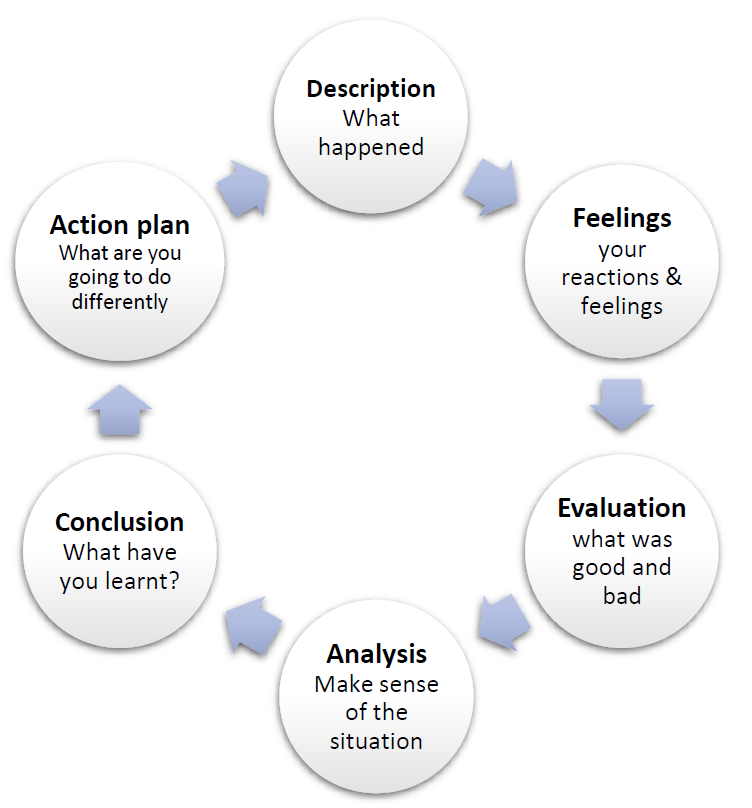
Preheat – Preparing for Interview
In preparation for our simulated interviews, we each had to find a job that we’d realistically apply for. Once we’d shared them with the rest of the group, we would create questions tailored for everyone’s respective jobs. I selected a video editor job with the company Thinktank Productions: https://thinktankvideo.co.uk/jobs/video-editor-jobs/ (see fig. 2).
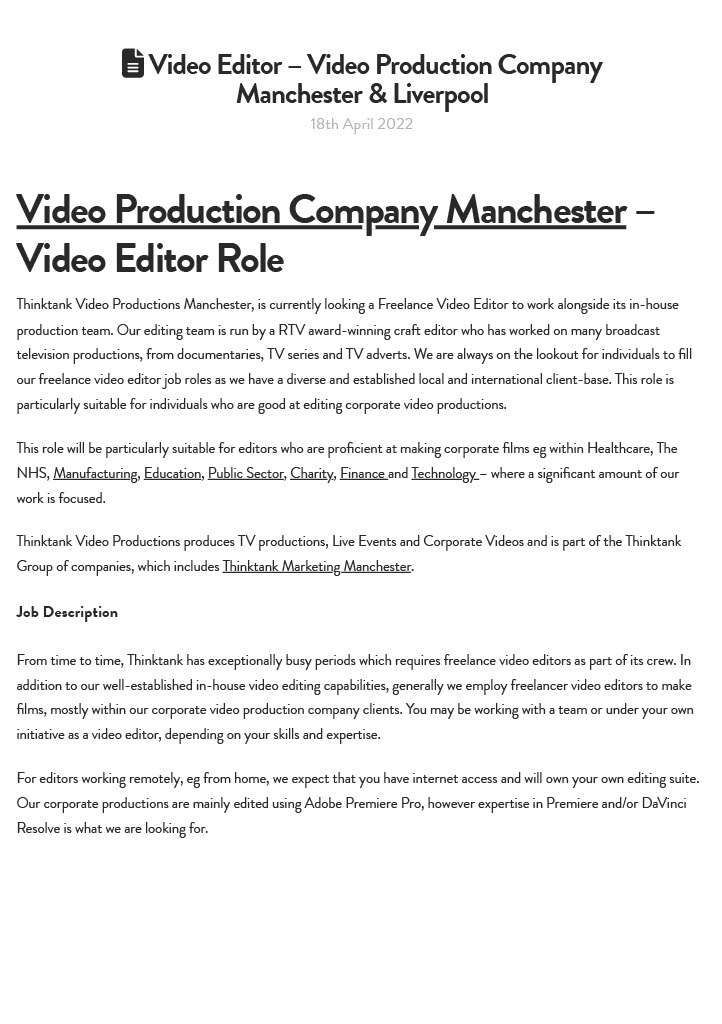
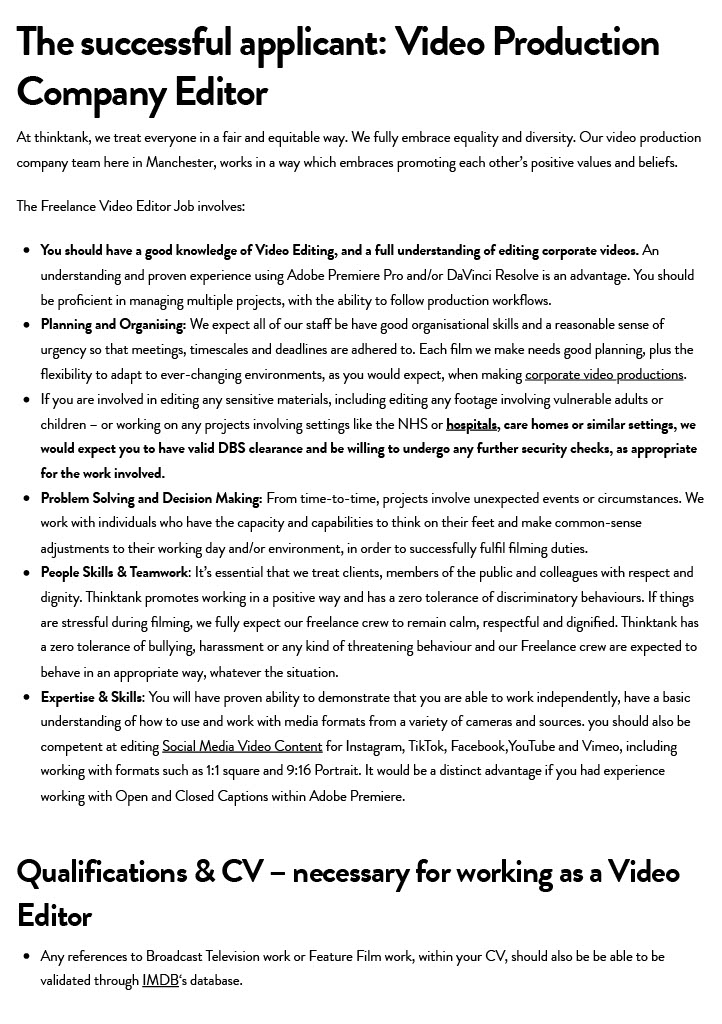
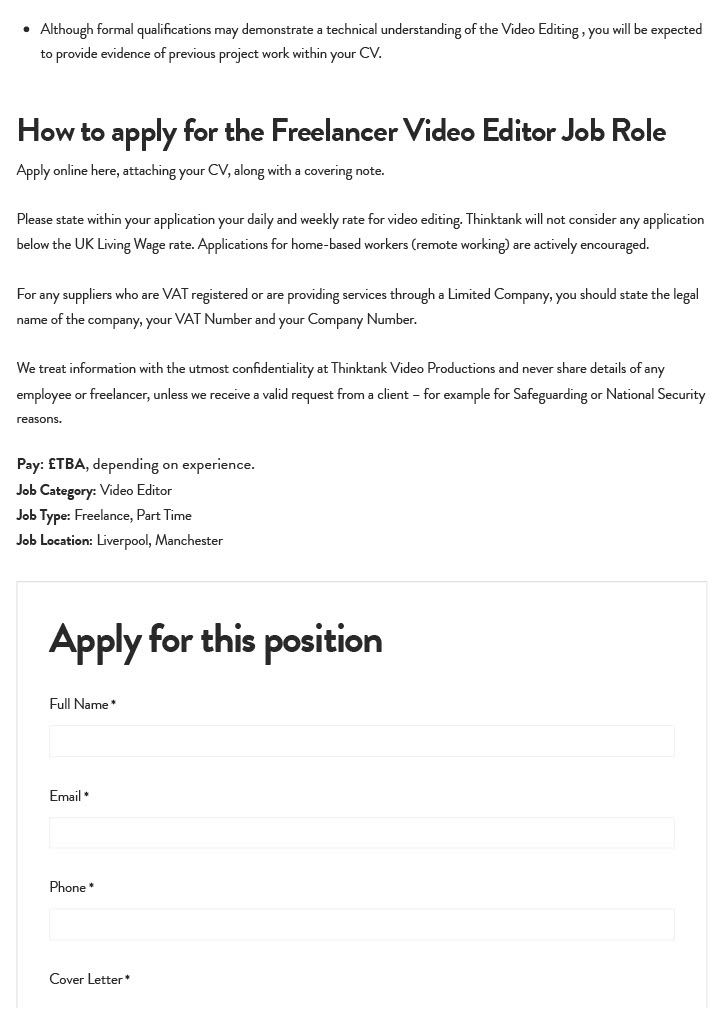
My initial feelings were quite relaxed as I knew it was only a simulated interview and editing is my strongest area of experience, however, my ‘pre-initial’ reactions were something along lines of screaming, crying and throwing up. This ‘pre-initial’ stage being the search for said job that I could realistically apply for. I found this daunting because many of the jobs I found required two years of professional experience… I’m two years short. Suddenly the prospect of landing a real job after my degree became that more daunting. Eventually, I found the Thinktank job the night before and decided to roll with it.
The Grill – The Questions
I have listed the key questions my group asked me as follows and will outline and evaluate my responses for them individually:
- What is your preferred editing software and why?
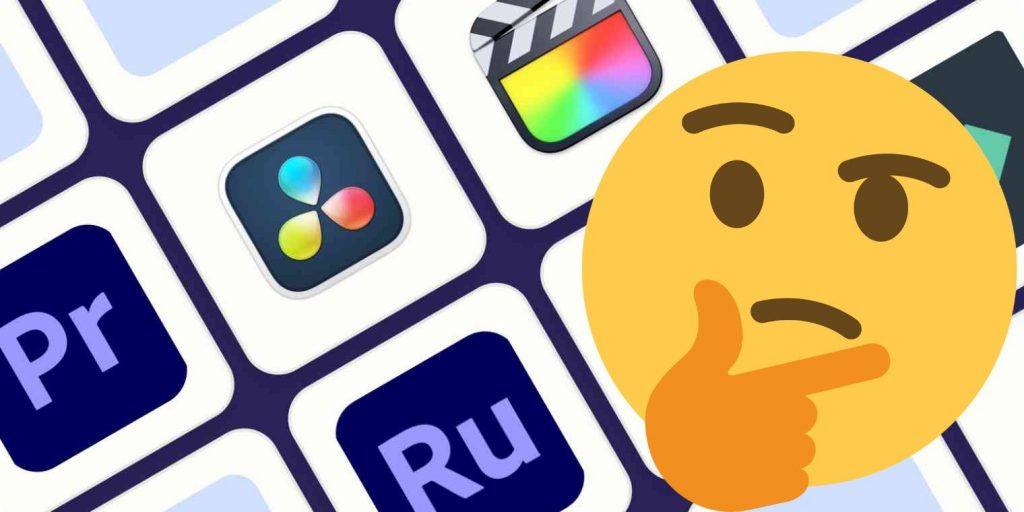
This was a relevant question to the job’s criteria as it stated, “proven experience using Adobe Premiere Pro and/or DaVinci Resolve is an advantage”. I answered Premiere Pro because its user interface is what I’m most familiar with. I made sure to mention that I’m also familiar with DaVinci Resolve, Avid Media Composer and Final Cut Pro.
My group stated that my answer showed good knowledge of editing software, therefore reflecting personal investment. However, they felt I sold myself short and could have emphasised my personal achievement more. I could have expanded on my range of experience with different editing software, basic and advanced, and how this range has developed my technical competency.
- Can you describe a time you had to work under pressure and how did you deal with it?
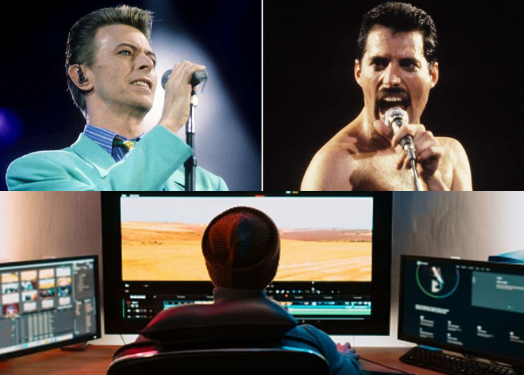
I recounted the situation last semester when I had to use a limited amount of footage, in a short amount of time, to complete two editing projects that related to our final year film. My task was to take the select footage we had and with minimal reuse, create an experimental mood piece for my personal portfolio and a teaser trailer for a collaborative pitch. I edited them in a way that was tonally different; my portfolio piece used long takes and eerie, melancholic music to create something that evoked the themes of our upcoming film, whereas for the teaser trailer I used quick cuts and tense, thrilling music to distinguish it as something exciting and attention grabbing. The result was successful because despite the similar footage and occasional reuse, I was able to give them a unique identity through editing.
My group thought that I gave a detailed answer that showed off my understanding of editing but, as before, felt I could have emphasised the task and my personal achievement more. I could have expanded more on the results, i.e., the high grades received for both projects and praise for the teaser from professional industry workers at our pitch.
- How do you spend your free time?

Ethan had been asked this question before me; he outlined his hobbies so that they related to the job criteria, but in doing so they sounded less like hobbies and more like part-time work. While it made sense to try and keep the answer relevant to the job, we all agreed that as a genuine answer it reflected a slightly unhealthy, workaholic mindset. Therefore, I tried to ensure that my answer indicated a healthy work life balance; I mentioned my interest in the sport, bouldering along with photography and videography as past times. Furthermore, I stated that I’m always keen to develop my eye for visual composition as well as my sense of rhythm and tone for editing, enabling me to complete video projects with polish and personality.
As before, feedback stated that my answer reflected genuine passion for video editing. However, I felt my answer could have been more cohesive, as I listed my hobbies rather miscellaneously. Holly took her turn after me and I was very impressed by her response to the same question, as she was able to relate her interest and achievements within football to her experience with sports broadcasting and media. While I don’t have the same experience, I think it’s worth considering how I can be more cohesive and relevant when describing my free time.
- Where do you see yourself in five years’ time?

I think five years passed before I was able to give an answer. It’s a question I’ve always brushed aside and never really expressed vocally. Eventually I answered that I want to continue writing short scripts that take place within the fantasy world I’ve been creating for several years. By focusing on the smaller, human stories I hope to gradually flesh out a larger, richer world so that I can either pitch, publish, or produce it as a franchise.
My group’s feedback was to not show panic with hard questions and to take time to think before answering. While my answer was strewn together in panic, I’m very happy with the content of it. It’s a far-off dream that I never think to mention in any context, professional or casual. Whether it remains a dream or not I would answer with it again as I think it reflects my passion for storytelling and active creativity.
- Why do you want to work for this company?

I wasn’t asked this, but it was posed to Annabel and I realise that it is a common job interview question. I had given myself enough time to take in the job criteria but didn’t investigate the company as much as I should have
My philosophy is that you hire to retain, so when I ask, “Why do you want to work with us”, I’m looking to learn what the candidate would like long-term. It’s similar to “Where do you see yourself in 5 years” — I want to know if their ideal career path is something that matches our growth opportunities.
Pamela Skillings (2019)
It’s important to know if you’re a good match for the company or project. It goes without saying that you would research the company before applying let alone before an interview. Furthermore, if you are good match, knowledge of the company will help to give clear and tailored examples when asked about your experiences.
Leave to Cool – Conclusion
Overall, my group’s consensus was that my answers were detailed, showed a good knowledge of software and expressed a clear passion for editing. Moreover, they thought I articulated myself well and maintained good eye contact. The reoccurring point of improvement was that I sold myself short and could have provided more detail in certain areas, i.e., ‘challenge’ and ‘result’, to really promote my skills and achievements. Reflecting upon the value of my experiences and being open about future ambitions will better equip me for later interviews, specifically in terms of confidence and the detail I give in my answers. Moreover, researching the given company will help me appeal and be more passionate about their criteria and goals. Ultimately, knowing what I want from a job is precedent to applying and landing one as myself and the employer need to know if I’m a good match.
Utensils – Bibliography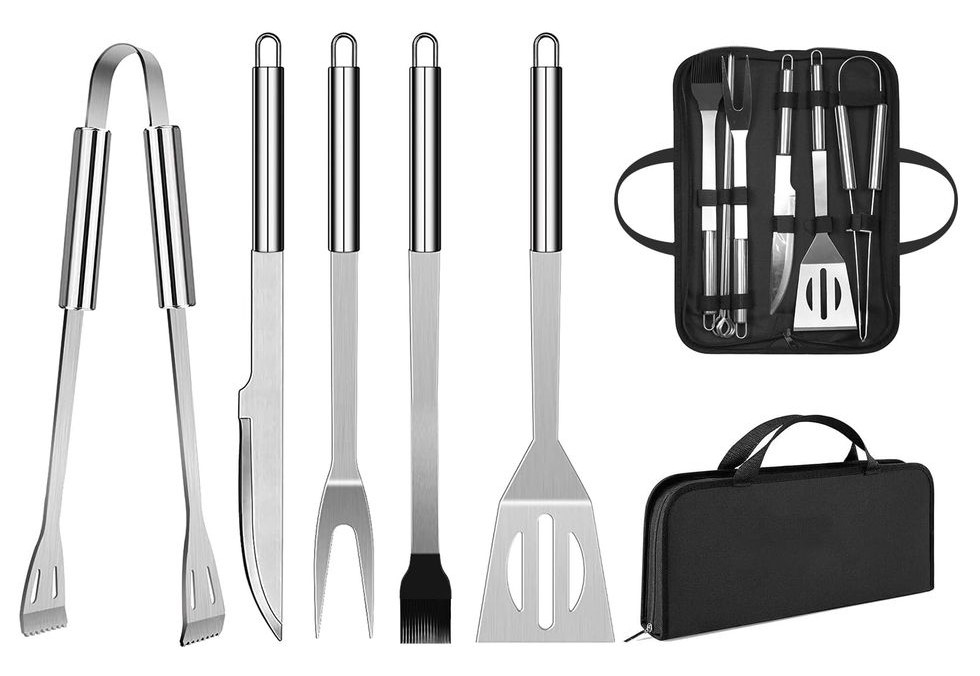
Gibbs, G., 1988. Learning by Doing. 1st ed. Oxford: Oxford Centre for Staff and Learning Development.
Queen’s University Belfast, 2020. Competency-Based Interviews. [Online]
Available at: Competency-Based Interviews
[Accessed 6 March 2024].
Rogers, C., 1969. Freedom to Learn. 2nd ed. Columbus: Merrill Publishing Company.
ScreenSkills. 2021. Tips for making a good impression in screen industries interviews. [online] Available at: https://www.youtube.com/watch?v=xHUZuGFPF8Y&t=21s [Accessed 7 March 2024]
ScreenSkills. 2021. What are different types of interview like?. [online] Available at: https://www.youtube.com/watch?v=Ejn9oie4IgU [Accessed 7 March 2024]
Skillings, P., 2019. Get Ready to Answer ‘Why Do You Want to Work Here’ – Big Interview Resources. [Online]
Available at: https://resources.biginterview.com/interview-questions-answers/why-do-you-want-to-work-here/
[Accessed 7 March 2024].
Thinktank Productions, 2022. Video Editor – Video Production Company Manchester & Liverpool. [Online]
Available at: https://thinktankvideo.co.uk/jobs/video-editor-jobs/
[Accessed 6 March 2024].